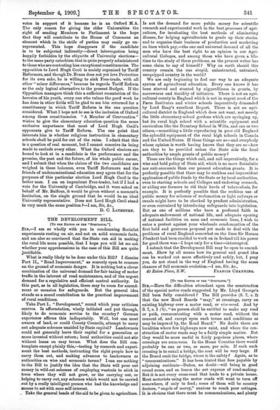THE DEVELOPMENT BILL.
tr. TEX EDITOR 01, TER "SPECTATOR...1
Sin,—I am so wholly with you in condemning Socialist experiments resting on air, and not on solid economic facts, and am also so convinced that the State can aid in making the rural life more possible, that I hope you will let me ask whether your apprehensions in the case of this Bill are quite justifiable.
What is really likely to be done under this Bill? I dismiss Part II., "Road Improvement," as scarcely open to censure on the ground of economic danger. It is nothing but a clever combination of the universal demand for fair taxing of motor traffic in the interest of road maintenance, and of the urgent demand for a regulative and efficient central authority. In this part, as in all legislation, there may be room for amend- ment or occasion for safeguards. But the general idea stands as a sound contribution to the practical improvement of rural conditions.
• Take Part I., "Development," round which your criticism centres. Is afforestation, wisely initiated and put through, likely to do economic service to the country? German experience affirms this indisputably. Well, but can most owners of land, or could County Councils, attempt to carry
• out adequate schemes unaided by State capital? Landowners could not generally leave their capital for a generation or more invested without return; local authorities could not stir without loans on easy terms. What does the Bill con- template except plainly this,—testing by research and experi- ment the best methods, instructing the right people how to carry them out, and making advances to landowners or authorities on wise and economic terms ? I can see nothing in the Bill to justify the idea that the State will pour out money in wild-cat schemes of employing wastrels to stick in trees where they will not grow, or the carrying out, or • helping to carry out, any schemes which would not be carried out by a really intelligent person who had the knowledge and means to act with sane self-interest.
... Take the general heads of the aid to be given to agriculture. Is not the demand for more public money for scientific research said experimental work in the best processes of agri- culture, for inculcating the best methods of eliminating disease, for helping agriculturists to grade up their stocks, and to organise their business of production and marketing on lines which pay,—the one and universal demand of all the men who have the best right to an opinion in our Agri- cultural Colleges, and among those who have given a life- time to the study of theae problems, as the present writer has some claim to say of himself ? Why on earth should this country remain the one stupid, uninstructed, untrained, unequipped country in the world ?
We are only beginning to feel our way to an adequate system of agricultural education_ Every one knows it has been starred and stunted by niggardliness in grants, by narrowness and timidity of initiative. There is not an agri- cultural county in England which is not in urgent need of the Farm Institutes and winter schools imperatively demanded by Lord Reay's excellent Report. There is not an agri- cultural district in England which does not want, not merely the little elementary-school gardens which are springing up, but its rural high school with a scientific equipment and curriculum like the Dauntsey School in Wilts, and one or two others,—something a little reproducing in poor old England the splendid equipment of the rural high schools in Canada and the United States. If these things are so—and everybody whose opinion is worth having knows that they are so—how are they to be provided unless the State aids the local .authorities by ample grants of public money ?
These are the things which call, and call imperatively, for a wise and bold policy of State aid, which is no more Socialistic nor anti-economic than our present education grants. It is perfectly possible that there may be reckless and improvident application of public funds by the State or by local authorities, even to starting schools and Colleges and endowing research, or aiding our farmers to rid their herds of tuberculosis, for example. It is perfectly possible that the reckless use of public money for schemes of reclamation or light railways or canals might have to be checked by prudent administration, or even restrained by introducing safeguards into legislation. But as one of millions who have a profound faith in adequate endowment of national life, and adequate opening of national facilities on sane and economic lines, I wish to enter a protest against your wholesale condemnation of the first bold and generous proposal yet made to deal with the problems of rural England somewhat on the lines Sir Horace Plunkett had been enabled to work on in Ireland till his power for good there was—I hope only for a time—interrupted.
I submit that the Development Bill may be open to amend- ment. Show by all means how its general and grand idea can be worked out more effectively and safely, but, I pray you, do not stand in the way of England having the same chances of full economic evolution.—I am, Sir, &c.,






































 Previous page
Previous page